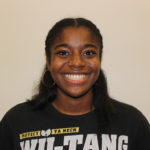I’d argue that the ‘90s was the golden age of Black culture for years, if ever someone was silly enough to disagree. The ‘90s brought the origin of the oversized, colorful, arguably ugly, patched clothing that people were smart enough to donate to thrift stores and kids are falsely nostalgic enough to pick up and wear proudly now. The ‘90s gave us very famous or infamous (depending on how one views it) East Coast versus West Coast rap beef that was heated, and deadly, unfortunately. People who are most resistant to change often refer to this era as the time of “real rap.”
After rap music, my second favorite part of ‘90s culture was the television. It seemed that the decade never ran out of things to watch. It had “Living Single.” (Disclaimer: “Friends” was better.) It had “A Different World,” “Family Matters” and “Sister, Sister.” It had “The Fresh Prince of Bel-Air.” You could watch television and find a happy Black family at just about any time of the day.
Clothing has evolved since — not necessarily into superior styles, but it has evolved nonetheless. Soulja Boy showed us an era of offensively oversized clothing. Everything looked like capes. Thundergate, Stratogale, Meta-Man, and Dynaguy were afraid for our lives. Then a time of tight clothing was ushered in until we arrived here — where skinny jeans are considered acceptable attire for all. Rap music has evolved into something completely different and beautiful, thanks to Lil Wayne and Young Thug almost exclusively.
The one facet of media that hasn’t exactly moved forward in a way I would’ve liked is television. There was my favorite show, “Everybody Hates Chris,” but it only ran four seasons before ending. There was a moment in one of my years of high school — that I couldn’t recall if you paid me — during which I was under the impression, as I’m certain many of my Black peers were, that “Empire” would finally be the show everyone could rally behind and love for a while. The first season was amazing. I missed the whole thing at the time (because I didn’t care to watch another second of anything with Terrence Howard), but I was scolded by my family and friends enough that I ended up binge watching the whole first season. It was a rollercoaster, something like a Florida headline. The second season was even worse, and I was back to square one: rewatching “Naruto” on Netflix.
The best shows with Black casts I regularly tune into right now are “Atlanta,” “Black-ish” and “Insecure.”
The opening scene of the first season of “Atlanta” depicted a Black woman lying in bed with her hair wrapped for the next day. It drips hilarity and oozes authenticity. The dialogue propels past palatable, which is all I can ask for, and genuinely sounds like a conversation among friends. The show is a masterpiece.
Meanwhile, “Black-ish” depicts a well-off, educated Black family navigating a white neighborhood. If my family stood in a funhouse mirror, we’d look a lot like that. Kenya Barris has done a phenomenal job of using the 30 minute show to touch on important issues faced by the Black community, maintaining humor and managing to have resolution at the end of each.
“Insecure” is one of the messiest shows I have ever seen in my life. The main character, Issa, and her friends display the entire spectrum of emotion within the very first season. They struggle without it being the premise of the program (*cough* “Good Times” *cough*). They all have real life problems, including financial problems, job security problems and relationship problems, without it ever tainting the comedy.
A show that I expected to be amazing, but fell far short of the mark, is “Grown-ish.” As it was a spinoff of “Black-ish,” I expected at least to leave the first season wanting more before it fell flat. The casting was the first big mistake. There is not a single dark-skinned character on the show. All of the students the show centers around are light-skinned, even though not all are Black. The show tried and failed with every episode to show any sense of having a resolution. The main problem with the show is that not all episodes are written by Black people, but they attempt to look through a Black lens to address the world. This must be stopped on all fronts; spinoffs in general should be stopped.
For me, current Black television is a mix of disappointment and being absolutely blown out of the water by how amazing it is. We need more Black content creators for certain. It’s possible that I won’t be satisfied until every single show has a fully diverse, Black cast in every corner of television. Maybe I won’t be. But no one could ever convince me that I’m wrong to feel that way.

